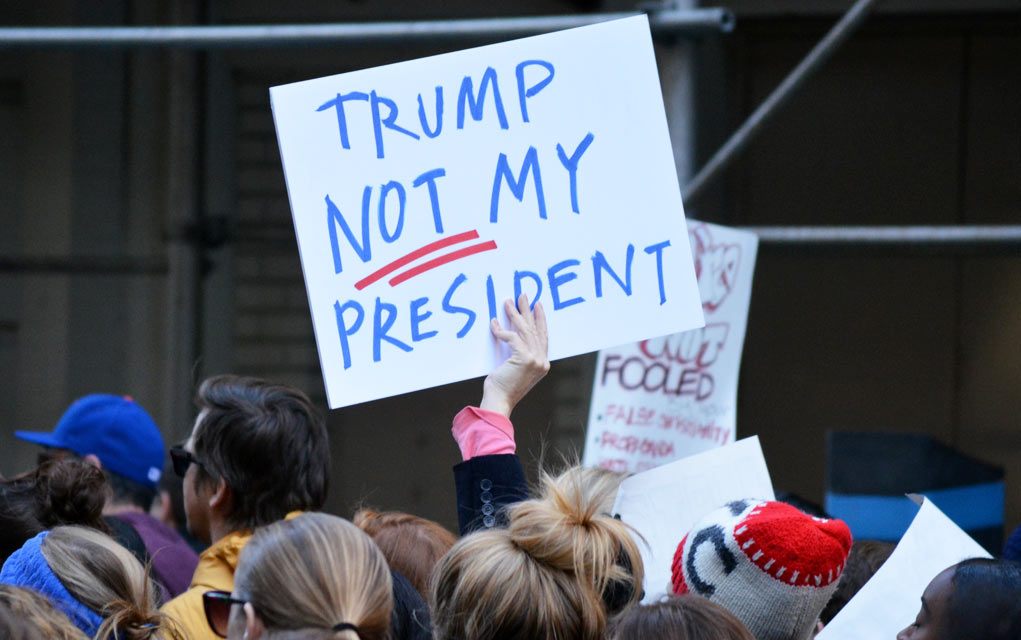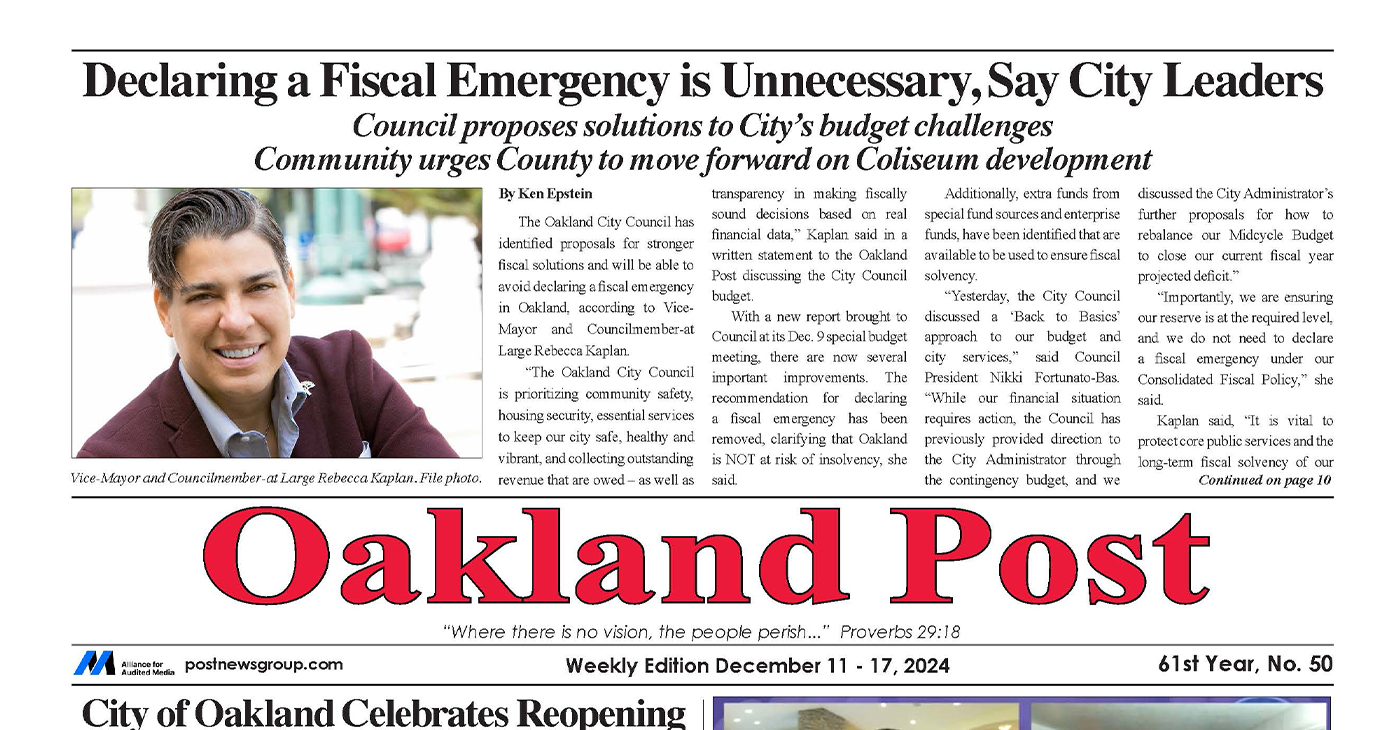Opinion
Opinion: Danger of Historical Amnesia in the Era of Trump

Protester carrying a sign while marching in an anti-Trump rally in New York City in 2016.
By Annie “Q” Sajid
This past President’s Day, many anti-Trump rallies were organized in the name of a “Not My President’s Day.” Ironically enough, the “Not My President” refrain began as a racist chant of the Tea Party to delegitimize Barack Obama’s status as the first Black US president. The framing of Trump as “Not My President” perpetuates the idea that his presidency is an outlier in American history. The backbone of the United States is built on the land theft and murder of Indigenous people and the violent enslavement of Black people. Trump’s win exemplifies the cycles of American history in which any perceived racial progress is inevitably followed by white backlash. To present Trump’s presidency as an unexpected crisis, rather than a byproduct of emboldened American white supremacy, erases this nation’s violent past.
Adrienne Maree Brown insightfully shared in her post-election reflection, “Things are not getting worse, they are getting uncovered. We must hold each other tight and continue to pull back the veil.” While there is a warranted collective anxiety around Trump’s incendiary and dehumanizing political rhetoric, his policies are not fundamentally different from the xenophobic and profit-driven policy agenda of previous presidents. Many liberals forget Obama was dubbed the deporter-in-chief because his administration oversaw the forcible removal of more than 3 million undocumented immigrants and a significant expansion of private for-profit detention centers. Resistance efforts against such inhumane policies were ongoing in the Obama era, but weren’t as visible as they are now.
In the current political moment, we have seen constant direct action, some with deep strategic movement-building such as the collaboration between the Movement for Black Lives and the It Takes Roots Alliance. Others have had a less intersectional understanding of what is at stake, such as the national women’s march which was held accountable for excluding the struggles of women of color, trans women, working-class women, and those whose experiences occupy multiple intersections.
postTo view Trump’s win as the “most volatile” political moment in American history is inaccurate. We are living in volatile and terrifying times, but they are not exceptional political times. We are living in a time of a resurgence and consolidation of power to white supremacist groups. We must vigilantly confront how the evolution of American democracy is not linear.
In Robin D.G. Kelley’s one-year reflection post-Trump, he proposes we move away from “a lack of political imagination beyond crisis recovery and beyond politics as problem management.” We must not just fight back, we must re-imagine and fight for movements that guarantee rights to low-income communities and communities of color including: right to a dignified and stable home, right to accessible and affordable transit, and the right to not just participate in democracy, but democratize power to correct the trajectory of American history.
Among other hats, Annie “Q” Sajid is a communications professional based in Oakland, CA. Currently, she works for Urban Habitat, a policy advocacy organization working to advance equitable policies for low-income communities and communities of color in the Bay Area.
Activism
Oakland Post: Week of December 11 – 17, 2024
The printed Weekly Edition of the Oakland Post: Week of December 11 – 17, 2024

To enlarge your view of this issue, use the slider, magnifying glass icon or full page icon in the lower right corner of the browser window. ![]()
Activism
Oakland Post: Week of December 4 – 10, 2024
The printed Weekly Edition of the Oakland Post: Week of December 4 – 10, 2024, 2024

To enlarge your view of this issue, use the slider, magnifying glass icon or full page icon in the lower right corner of the browser window. ![]()
Activism
COMMENTARY: PEN Oakland Entices: When the News is Bad, Try Poetry
Strongman politics is not for the weak. Here in the U.S., Donald Trump is testing how strongman politics could work in the world’s model democracy.

By Emil Guillermo
As the world falls apart, you need more poetry in your life.
I was convinced on Tuesday when a weak and unpopular president of South Korea — a free nation U.S. ally — tried to save himself by declaring martial law.
Was it a stunt? Maybe. But indicative of the South Korean president’s weakness, almost immediately, the parliament there voted down his declaration.
The takeaway: in politics, nothing quite works like it used to.
Strongman politics is not for the weak. Here in the U.S., Donald Trump is testing how strongman politics could work in the world’s model democracy.
Right now, we need more than a prayer.
NEWS ANTIDOTE? LITERATURE
As we prepare for another Trump administration, my advice: Take a deep breath, and read more poetry, essays and novels.
From “Poetry, Essays and Novels,” the acronym PEN is derived.
Which ones to read?
Register (tickets are limited) to join Tennessee Reed and myself as we host PEN OAKLAND’s award ceremony this Saturday on Zoom, in association with the Oakland Public Library.
Find out about what’s worth a read from local artists and writers like Cheryl Fabio, Jack Foley, Maw Shein Win, and Lucille Lang Day.
Hear from award winning writers like Henry Threadgill, Brent Hayes Edwards and Airea D. Matthews.
PEN Oakland is the local branch of the national PEN. Co-founded by the renowned Oakland writer, playwright, poet and novelist Ishmael Reed, Oakland PEN is special because it is a leader in fighting to include multicultural voices.
Reed is still writing. So is his wife Carla Blank, whose title essay in the new book, “A Jew in Ramallah, And Other Essays,” (Baraka Books), provides an artist’s perspective on the conflict in Gaza.
Of all Reed’s work, it’s his poetry that I’ve found the most musical and inspiring.
It’s made me start writing and enjoying poetry more intentionally. This year, I was named poet laureate of my small San Joaquin rural town.
Now as a member of Oakland PEN, I can say, yes, I have written poetry and essays, but not a novel. One man shows I’ve written, so I have my own sub-group. My acronym: Oakland PEOMS.
Reed’s most recent book of poetry, “Why the Black Hole Sings the Blues, Poems 2007-2020” is one of my favorites. One poem especially captures the emerging xenophobia of the day. I offer you the first stanza of “The Banishment.”
We don’t want you here
Your crops grow better than ours
We don’t want you here
You’re not one of our kind
We’ll drive you out
As thou you were never here
Your names, family, and history
We’ll make them all disappear.
There’s more. But that stanza captures the anxiety many of us feel from the threat of mass deportations. The poem was written more than four years ago during the first Trump administration.
We’ve lived through all this before. And survived.
The news sometimes lulls us into acquiescence, but poetry strikes at the heart and forces us to see and feel more clearly.
About the Author
Emil Guillermo is a journalist and commentator. Join him at www.patreon.com/emilamok
-

 Activism4 weeks ago
Activism4 weeks agoOakland Post: Week of November 20 – 26, 2024
-

 California Black Media3 weeks ago
California Black Media3 weeks agoCalifornia to Offer $43.7 Million in Federal Grants to Combat Hate Crimes
-

 Activism4 weeks ago
Activism4 weeks agoAn Inside Look into How San Francisco Analyzes Homeless Encampments
-

 California Black Media3 weeks ago
California Black Media3 weeks agoCalifornia Department of Aging Offers Free Resources for Family Caregivers in November
-

 Black History3 weeks ago
Black History3 weeks agoEmeline King: A Trailblazer in the Automotive Industry
-

 California Black Media3 weeks ago
California Black Media3 weeks agoGov. Newsom Goes to Washington to Advocate for California Priorities
-

 Activism3 weeks ago
Activism3 weeks agoOCCUR Hosts “Faith Forward” Conference in Oakland
-

 #NNPA BlackPress4 weeks ago
#NNPA BlackPress4 weeks agoPRESS ROOM: Clyburn, Pressley, Scanlon, Colleagues Urge Biden to Use Clemency Power to Address Mass Incarceration Before Leaving Office






















































